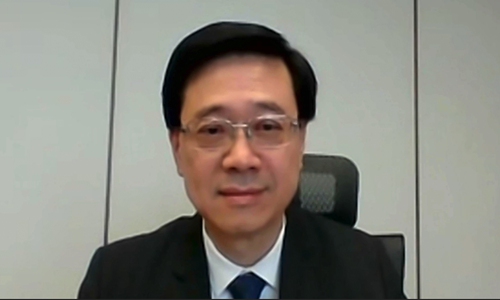HK official slams extradition moves
By Chen Qingqing and Bai Yunyi Source: Global Times Published: 2020/7/15 20:03:40
‘Authorities always able to hold fugitives accountable’

Hong Kong secretary for security John Lee Ka-chiu
It is a highly irresponsible move that undermines the rule of law for countries to drop extradition agreements with the Hong Kong Special Administration Region (HKSAR) in opposing the national security law for Hong Kong, John Lee Ka-chiu, Hong Kong Secretary for Security, told the Global Times in an exclusive interview on Wednesday.
However, law enforcement authorities are always able to hold fugitives accountable through different measures such as international police cooperation or other ways, he said.
The HKSAR has extradition agreements with some 20 countries including the US, the UK, Canada, Australia and Germany.With the national security law in force for half a month, Canada became the first country to announce ending the treaty with the HKSAR.
Australia has also suspended its extradition treaty with the Chinese city, while US President Donald Trump signed an executive order on Wednesday to impose sanctions on the HKSAR, including ending its special status and tearing up an extradition treaty with the city.
A latest meeting of EU foreign ministers held on Monday hinted at the possible review of the extradition agreements of each country with the HKSAR. The meeting did not elaborate on whether European countries should follow the move of Five Eyes countries, which is also a reckless move, inflaming tension with the Chinese mainland.
"If a country abandons such an agreement, it also abandons its international responsibility of cooperating in cracking down on criminals," Lee said, noting that such a decision would be highly irresponsible and a form of political manipulation.
In other words, this move is encouraging criminal activities, inciting those by some suspects who would consider that they won't be held accountable after violating the law in Hong Kong, "and this betrays the rule of law," the official added.
Even though countries like Canada and Australia ended their extradition treaties with the HKSAR, local authorities would always have different ways of pursuing suspects who flee to those countries and holding them accountable, the secretary said, noting that the measures include international police cooperation and other ways.
When some Western media organizations like the New York Times and Fortune claimed that the new law gives the Hong Kong Police Force (HKPF) "sweeping" powers and curtails the so-called freedom of the internet, as the police are granted new powers to raid premises without a court warrant and order internet firms to remove content, or seize their equipment, Lee said such claims "are indeed exaggerations."
"There's nothing that's changed since the law was enacted. We use the internet like we did before," the official said.
Every day, there are more than 100 million pieces of information circulating on the internet in the HKSAR, but the chance for the HKPF to use its new powers in ordering internet firms to remove such online information is less one time per day, as the law only targets four specified types of activities endangering national security, Lee noted.
"Freedom of information is guaranteed by the Basic Law. If someone violates the law, we will take action in accordance with the law. Every country takes similar moves," he said.
After the rules of implementation for the national security law were unveiled, US internet giants Google, Facebook and Twitter said that they had suspended processing requests for user data from Hong Kong law enforcement agencies, giving the excuse of protecting freedom of speech, which is widely seen as a smoke screen that shows their double standards in China-related issues. The Hong Kong official believes that each company has its own considerations, including how to cooperate with its own country.
"But the law clearly outlines their major responsibilities. If they violate the law, no matter what excuse the company has, it would be liable," Lee said.
Even before the national security law was implemented in the city, the HKPF handled more than 1,000 technology crimes every year, which all require cooperation from internet suppliers, the official noted. However, the deterrent effect of the law has already become apparent, as some of the pro-independence organizations and those colluding with foreign forces already shut down even before the law took effect. "I believe the number of posts posing threats to national security would decrease under the law," he said.
Lee, who is also a member of a newly established committee for safeguarding national security of the HKSAR, took part in the first meeting of the committee on July 6. The major work is to empower authorities to effectively enforce the law and assume their responsibility in safeguarding national security, he noted.
"There are various possibilities including regular meetings or convening meetings when it's necessary," Lee said.
Posted in: HK/MACAO/TAIWAN